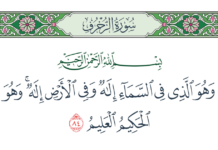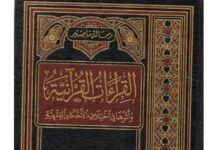2. QS. Al-Baqarah (Sapi Betina) - 286 Ayat
وَاِذَا طَلَّقْتُمُ النِّسَاۤءَ فَبَلَغْنَ اَجَلَهُنَّ فَاَمْسِكُوْهُنَّ بِمَعْرُوْفٍ اَوْ سَرِّحُوْهُنَّ بِمَعْرُوْفٍۗ وَلَا تُمْسِكُوْهُنَّ ضِرَارًا لِّتَعْتَدُوْا ۚ وَمَنْ يَّفْعَلْ ذٰلِكَ فَقَدْ ظَلَمَ نَفْسَهٗ ۗ وَلَا تَتَّخِذُوْٓا اٰيٰتِ اللّٰهِ هُزُوًا وَّاذْكُرُوْا نِعْمَتَ اللّٰهِ عَلَيْكُمْ وَمَآ اَنْزَلَ عَلَيْكُمْ مِّنَ الْكِتٰبِ وَالْحِكْمَةِ يَعِظُكُمْ بِهٖ ۗوَاتَّقُوا اللّٰهَ وَاعْلَمُوْٓا اَنَّ اللّٰهَ بِكُلِّ شَيْءٍ عَلِيْمٌ
231. Dan apabila kamu menceraikan istri-istri (kamu), lalu sampai (akhir) idahnya, maka tahanlah mereka dengan cara yang baik, atau ceraikanlah mereka dengan cara yang baik (pula). Dan janganlah kamu tahan mereka dengan maksud jahat untuk menzalimi mereka. Barangsiapa melakukan demikian, maka dia telah menzalimi dirinya sendiri. Dan janganlah kamu jadikan ayat-ayat Allah sebagai bahan ejekan. Ingatlah nikmat Allah kepada kamu, dan apa yang telah diturunkan Allah kepada kamu yaitu Kitab (Al-Qur’an) dan Hikmah (Sunnah), untuk memberi pengajaran kepadamu. Dan bertakwalah kepada Allah dan ketahuilah bahwa Allah Maha Mengetahui segala sesuatu.
And when you divorce women and they have [nearly] fulfilled their term, either retain them according to acceptable terms or release them according to acceptable terms, and do not keep them, intending harm, to transgress [against them]. And whoever does that has certainly wronged himself. And do not take the verses of Allah in jest. And remember the favor of Allah upon you and what has been revealed to you of the Book and wisdom by which He instructs you. And fear Allah and know that Allah is Knowing of all things.
وَاِذَا طَلَّقْتُمُ النِّسَاۤءَ فَبَلَغْنَ اَجَلَهُنَّ فَلَا تَعْضُلُوْهُنَّ اَنْ يَّنْكِحْنَ اَزْوَاجَهُنَّ اِذَا تَرَاضَوْا بَيْنَهُمْ بِالْمَعْرُوْفِ ۗ ذٰلِكَ يُوْعَظُ بِهٖ مَنْ كَانَ مِنْكُمْ يُؤْمِنُ بِاللّٰهِ وَالْيَوْمِ الْاٰخِرِ ۗ ذٰلِكُمْ اَزْكٰى لَكُمْ وَاَطْهَرُ ۗ وَاللّٰهُ يَعْلَمُ وَاَنْتُمْ لَا تَعْلَمُوْنَ
232. Dan apabila kamu menceraikan istri-istri (kamu), lalu sampai idahnya, maka jangan kamu halangi mereka menikah (lagi) dengan calon suaminya, apabila telah terjalin kecocokan di antara mereka dengan cara yang baik. Itulah yang dinasihatkan kepada orang-orang di antara kamu yang beriman kepada Allah dan hari akhir. Itu lebih suci bagimu dan lebih bersih. Dan Allah mengetahui, sedangkan kamu tidak mengetahui.
And when you divorce women and they have fulfilled their term, do not prevent them from remarrying their [former] husbands if they agree among themselves on an acceptable basis. That is instructed to whoever of you believes in Allah and the Last Day. That is better for you and purer, and Allah knows and you know not.
وَالْوٰلِدٰتُ يُرْضِعْنَ اَوْلَادَهُنَّ حَوْلَيْنِ كَامِلَيْنِ لِمَنْ اَرَادَ اَنْ يُّتِمَّ الرَّضَاعَةَ ۗ وَعَلَى الْمَوْلُوْدِ لَهٗ رِزْقُهُنَّ وَكِسْوَتُهُنَّ بِالْمَعْرُوْفِۗ لَا تُكَلَّفُ نَفْسٌ اِلَّا وُسْعَهَا ۚ لَا تُضَاۤرَّ وَالِدَةٌ ۢبِوَلَدِهَا وَلَا مَوْلُوْدٌ لَّهٗ بِوَلَدِهٖ وَعَلَى الْوَارِثِ مِثْلُ ذٰلِكَ ۚ فَاِنْ اَرَادَا فِصَالًا عَنْ تَرَاضٍ مِّنْهُمَا وَتَشَاوُرٍ فَلَا جُنَاحَ عَلَيْهِمَا ۗوَاِنْ اَرَدْتُّمْ اَنْ تَسْتَرْضِعُوْٓا اَوْلَادَكُمْ فَلَا جُنَاحَ عَلَيْكُمْ اِذَا سَلَّمْتُمْ مَّآ اٰتَيْتُمْ بِالْمَعْرُوْفِۗ وَاتَّقُوا اللّٰهَ وَاعْلَمُوْٓا اَنَّ اللّٰهَ بِمَا تَعْمَلُوْنَ بَصِيْرٌ
233. Dan ibu-ibu hendaklah menyusui anak-anaknya selama dua tahun penuh, bagi yang ingin menyusui secara sempurna. Dan kewajiban ayah menanggung nafkah dan pakaian mereka dengan cara yang patut. Seseorang tidak dibebani lebih dari kesanggupannya. Janganlah seorang ibu menderita karena anaknya dan jangan pula seorang ayah (menderita) karena anaknya. Ahli waris pun (berkewajiban) seperti itu pula. Apabila keduanya ingin menyapih dengan persetujuan dan permusyawaratan antara keduanya, maka tidak ada dosa atas keduanya. Dan jika kamu ingin menyusukan anakmu kepada orang lain, maka tidak ada dosa bagimu memberikan pembayaran dengan cara yang patut. Bertakwalah kepada Allah dan ketahuilah bahwa Allah Maha Melihat apa yang kamu kerjakan.
Mothers may breastfeed their children two complete years for whoever wishes to complete the nursing [period]. Upon the father is the mothers’ provision and their clothing according to what is acceptable. No person is charged with more than his capacity. No mother should be harmed through her child, and no father through his child. And upon the [father’s] heir is [a duty] like that [of the father]. And if they both desire weaning through mutual consent from both of them and consultation, there is no blame upon either of them. And if you wish to have your children nursed by a substitute, there is no blame upon you as long as you give payment according to what is acceptable. And fear Allah and know that Allah is Seeing of what you do.
وَالَّذِيْنَ يُتَوَفَّوْنَ مِنْكُمْ وَيَذَرُوْنَ اَزْوَاجًا يَّتَرَبَّصْنَ بِاَنْفُسِهِنَّ اَرْبَعَةَ اَشْهُرٍ وَّعَشْرًا ۚ فَاِذَا بَلَغْنَ اَجَلَهُنَّ فَلَا جُنَاحَ عَلَيْكُمْ فِيْمَا فَعَلْنَ فِيْٓ اَنْفُسِهِنَّ بِالْمَعْرُوْفِۗ وَاللّٰهُ بِمَا تَعْمَلُوْنَ خَبِيْرٌ
234. Dan orang-orang yang mati di antara kamu serta meninggalkan istri-istri hendaklah mereka (istri-istri) menunggu empat bulan sepuluh hari. Kemudian apabila telah sampai (akhir) idah mereka, maka tidak ada dosa bagimu mengenai apa yang mereka lakukan terhadap diri mereka menurut cara yang patut. Dan Allah Maha Mengetahui apa yang kamu kerjakan.
And those who are taken in death among you and leave wives behind – they, [the wives, shall] wait four months and ten [days]. And when they have fulfilled their term, then there is no blame upon you for what they do with themselves in an acceptable manner. And Allah is [fully] Acquainted with what you do.
وَلَا جُنَاحَ عَلَيْكُمْ فِيْمَا عَرَّضْتُمْ بِهٖ مِنْ خِطْبَةِ النِّسَاۤءِ اَوْ اَكْنَنْتُمْ فِيْٓ اَنْفُسِكُمْ ۗ عَلِمَ اللّٰهُ اَنَّكُمْ سَتَذْكُرُوْنَهُنَّ وَلٰكِنْ لَّا تُوَاعِدُوْهُنَّ سِرًّا اِلَّآ اَنْ تَقُوْلُوْا قَوْلًا مَّعْرُوْفًا ەۗ وَلَا تَعْزِمُوْا عُقْدَةَ النِّكَاحِ حَتّٰى يَبْلُغَ الْكِتٰبُ اَجَلَهٗ ۗوَاعْلَمُوْٓا اَنَّ اللّٰهَ يَعْلَمُ مَا فِيْٓ اَنْفُسِكُمْ فَاحْذَرُوْهُ ۚوَاعْلَمُوْٓا اَنَّ اللّٰهَ غَفُوْرٌ حَلِيْمٌ
235. Dan tidak ada dosa bagimu meminang perempuan-perempuan itu dengan sindiran atau kamu sembunyikan (keinginanmu) dalam hati. Allah mengetahui bahwa kamu akan menyebut-nyebut kepada mereka. Tetapi janganlah kamu membuat perjanjian (untuk menikah) dengan mereka secara rahasia, kecuali sekedar mengucapkan kata-kata yang baik. Dan janganlah kamu menetapkan akad nikah, sebelum habis masa idahnya. Ketahuilah bahwa Allah mengetahui apa yang ada dalam hatimu, maka takutlah kepada-Nya. Dan ketahuilah bahwa Allah Maha Pengampun, Maha Penyantun.
There is no blame upon you for that to which you [indirectly] allude concerning a proposal to women or for what you conceal within yourselves. Allah knows that you will have them in mind. But do not promise them secretly except for saying a proper saying. And do not determine to undertake a marriage contract until the decreed period reaches its end. And know that Allah knows what is within yourselves, so beware of Him. And know that Allah is Forgiving and Forbearing.
لَا جُنَاحَ عَلَيْكُمْ اِنْ طَلَّقْتُمُ النِّسَاۤءَ مَا لَمْ تَمَسُّوْهُنَّ اَوْ تَفْرِضُوْا لَهُنَّ فَرِيْضَةً ۖ وَّمَتِّعُوْهُنَّ عَلَى الْمُوْسِعِ قَدَرُهٗ وَعَلَى الْمُقْتِرِ قَدَرُهٗ ۚ مَتَاعًا ۢبِالْمَعْرُوْفِۚ حَقًّا عَلَى الْمُحْسِنِيْنَ
236. Tidak ada dosa bagimu, jika kamu menceraikan istri-istri kamu yang belum kamu sentuh (campuri) atau belum kamu tentukan maharnya. Dan hendaklah kamu beri mereka mut‘ah, bagi yang mampu menurut kemampuannya dan bagi yang tidak mampu menurut kesanggupannya, yaitu pemberian dengan cara yang patut, yang merupakan kewajiban bagi orang-orang yang berbuat kebaikan.
There is no blame upon you if you divorce women you have not touched nor specified for them an obligation. But give them [a gift of] compensation – the wealthy according to his capability and the poor according to his capability – a provision according to what is acceptable, a duty upon the doers of good.
وَاِنْ طَلَّقْتُمُوْهُنَّ مِنْ قَبْلِ اَنْ تَمَسُّوْهُنَّ وَقَدْ فَرَضْتُمْ لَهُنَّ فَرِيْضَةً فَنِصْفُ مَا فَرَضْتُمْ اِلَّآ اَنْ يَّعْفُوْنَ اَوْ يَعْفُوَا الَّذِيْ بِيَدِهٖ عُقْدَةُ النِّكَاحِ ۗ وَاَنْ تَعْفُوْٓا اَقْرَبُ لِلتَّقْوٰىۗ وَلَا تَنْسَوُا الْفَضْلَ بَيْنَكُمْ ۗ اِنَّ اللّٰهَ بِمَا تَعْمَلُوْنَ بَصِيْرٌ
237. Dan jika kamu menceraikan mereka sebelum kamu sentuh (campuri), padahal kamu sudah menentukan Maharnya, maka (bayarlah) seperdua dari yang telah kamu tentukan, kecuali jika mereka (membebaskan) atau dibebaskan oleh orang yang akad nikah ada di tangannya. Pembebasan itu lebih dekat kepada takwa. Dan janganlah kamu lupa kebaikan di antara kamu. Sungguh, Allah Maha Melihat apa yang kamu kerjakan.
And if you divorce them before you have touched them and you have already specified for them an obligation, then [give] half of what you specified – unless they forego the right or the one in whose hand is the marriage contract foregoes it. And to forego it is nearer to righteousness. And do not forget graciousness between you. Indeed Allah, of whatever you do, is Seeing.
حَافِظُوْا عَلَى الصَّلَوٰتِ وَالصَّلٰوةِ الْوُسْطٰى وَقُوْمُوْا لِلّٰهِ قٰنِتِيْنَ
238. Peliharalah semua salat dan salat wustha. Dan laksanakanlah (salat) karena Allah dengan khusyuk.
Maintain with care the [obligatory] prayers and [in particular] the middle prayer and stand before Allah, devoutly obedient.
فَاِنْ خِفْتُمْ فَرِجَالًا اَوْ رُكْبَانًا ۚ فَاِذَآ اَمِنْتُمْ فَاذْكُرُوا اللّٰهَ كَمَا عَلَّمَكُمْ مَّا لَمْ تَكُوْنُوْا تَعْلَمُوْنَ
239. Jika kamu takut (ada bahaya), salatlah sambil berjalan kaki atau berkendaraan. Kemudian apabila telah aman, maka ingatlah Allah (salatlah), sebagaimana Dia telah mengajarkan kepadamu apa yang tidak kamu ketahui.
And if you fear [an enemy, then pray] on foot or riding. But when you are secure, then remember Allah [in prayer], as He has taught you that which you did not [previously] know.
وَالَّذِيْنَ يُتَوَفَّوْنَ مِنْكُمْ وَيَذَرُوْنَ اَزْوَاجًاۖ وَّصِيَّةً لِّاَزْوَاجِهِمْ مَّتَاعًا اِلَى الْحَوْلِ غَيْرَ اِخْرَاجٍ ۚ فَاِنْ خَرَجْنَ فَلَا جُنَاحَ عَلَيْكُمْ فِيْ مَا فَعَلْنَ فِيْٓ اَنْفُسِهِنَّ مِنْ مَّعْرُوْفٍۗ وَاللّٰهُ عَزِيْزٌ حَكِيْمٌ
240. Dan orang-orang yang akan mati di antara kamu dan meninggalkan istri-istri, hendaklah membuat wasiat untuk istri-istrinya, (yaitu) nafkah sampai setahun tanpa mengeluarkannya (dari rumah). Tetapi jika mereka keluar (sendiri), maka tidak ada dosa bagimu (mengenai apa) yang mereka lakukan terhadap diri mereka sendiri dalam hal-hal yang baik. Allah Mahaperkasa, Mahabijaksana.
And those who are taken in death among you and leave wives behind – for their wives is a bequest: maintenance for one year without turning [them] out. But if they leave [of their own accord], then there is no blame upon you for what they do with themselves in an acceptable way. And Allah is Exalted in Might and Wise.

![Relevansi QS. Al-Anbiyā’ [21]: 107 untuk Pendidikan Pluralistik dalam Kurikulum Cinta Relevansi QS. Al-Anbiyā’ [21]: 107 untuk Pendidikan Pluralistik dalam Kurikulum Cinta](https://tafsiralquran.id/wp-content/uploads/2026/02/Screenshot-2026-02-08-at-21.27.41-218x150.png)










